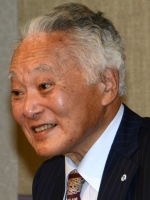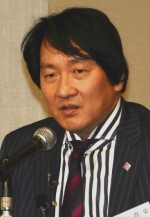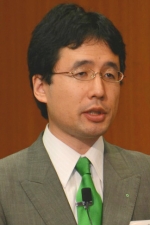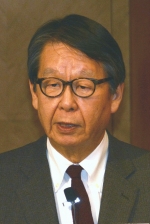December 06, 2016
"Global Research Reveals a Healthy Diet for a Longer Healthy Life Expectancy"
December 6, 2016 at Courtyard by Marriott Tokyo Ginza Hotel
Dr. Yukio Yamori, the preeminent authority in the field of preventive nutrition and medical research, proposed to the World Health Organization that he conduct research into dietary practices and commenced the WHO CARDIAC Study in 61 regions in 25 countries in the 1980s. He developed a method to identify the nutrients consumed by an individual by analyzing urine collected over a span of 24 hours and studied the correlation between diet and health.
The studies revealed that large quantities of antioxidant nutrients such as soy beans, vegetables and fish that have a high taurine content in the diet help prevent high blood pressure and cancer. He explained that "the long lifespan of the Japanese had been maintained by our diet, which includes large amounts of soy and fish."
Despite this long lifespan, however, he pointed out that healthy life expectancy is short. He attributed this to the traditional diet in which soy and fish are consumed in the form of salted preserves and miso paste, which has a high salt content. Activities organized for 10 years by Hyogo Prefecture to promote a healthy diet were presented. Encouraging the consumption of more rice, soy beans and other traditional Japanese food ingredients, along with a drive to reduce salt intake in which the average salt intake that had been 12 grams per day was reduced to 2 grams, saw improvements in health indicators for blood pressure and triglyceride levels.
Known as a proponent of the health benefits of soy isoflavone and Caspian Sea yogurt (matsoni), Dr. Yamori gave a presentation on the vital importance of improving diet with a humorous and light-hearted approach that drew laughter from the audience.
Dr. Yukio Yamori
Director, Institute for World Health Development, Mukogawa Women's University

September 23, 2016
"Creating Innovation through Industry-Academia Cooperation"
September 23, 2016 at Courtyard by Marriott Tokyo Ginza Hotel
TLO is the acronym for the Technology Licensing Organization, a body designed to bridge the gap between the industrial sector and academia through patenting research achievements by university researchers and transferring technology to private enterprises. Mr. Yamamoto explained that development of the basic technologies for the synthesizer, the search engine and audio systems all originated in universities. In the US, where these kinds of projects are actively organized, universities act as production centers for intellectual property, resulting in the generation of jobs and support for SMEs.
Technology transfer in Japan suffers from the disparity between universities. Despite this, he said,"New technology licensing in Japan has nearly doubled over the past four years. Although the number of these transfers has not yet caught up with the US, Japan does not necessarily lag behind the US." In order to accelerate innovation through industry-academia cooperation in Japan, he proposed fostering human resources with technology transfer knowhow, creating funds to encourage the commercialization of basic research and a preferential taxation scheme that would encourage big businesses to invest in venture projects. Lastly, he added, "Universities are beginning to seriously examine how they can extend their contribution beyond joint research projects and publication of theses into collaboration with the industrial sector.”
Mr. Takafumi Yamamoto
President, TODAI TLO, Ltd.

June 30, 2016
"I’ve decided to save the Earth with Euglena"
June 30, 2016 at Courtyard by Marriott Tokyo Ginza Hotel
Mr. Izumo opened his speech with stories of his travels to Bangladesh during his university days, where he witnessed people suffering from malnutrition and was motivated to do research in this area. This led to his discovery of the potential of Euglena, which contains both plant and animal protein, despite it being closely related to sea tangle and other seaweeds. He reflected on the success he achieved in 2005 with the world's first mass outdoor cultivation of Euglena for use as a food.
He also spoke of being driven to the brink of bankruptcy after an unsuccessful marketing drive covering 500 companies in the first two years, and of how the 501st company he visited, ITOCHU Corporation, agreed to cooperate with commercializing his business idea, which proved to be successful. He remarked that, as his story shown, society must support young people, students and universities in taking on new challenges. He added, "Big businesses are aware of the importance of open innovation. For development in this direction, they should see risk positively as an opportunity and invest actively in the potential presented by young researchers and universities." He argued that "innovation will happen, even when there is only a 1% chance of success, as long as tests are repeated for long enough and suitable technology is applied.”
He concluded his speech with a promise to develop a jet fuel made from Euglena that can be used to fly passenger aircraft by the year 2020, drawing loud applause from the audience.
Mr. Mitsuru Izumo
President, euglena Co., Ltd.

March 10, 2016
"Innovation: How to Revitalize Innovation in Japan"
March 10, 2016 at Courtyard by Marriott Tokyo Ginza Hotel
Speaking as a specialist in innovation policy and in economic analysis of technological innovation and of competition policy, Dr. Goto spoke of the differences among countries in their respective images toward the innovation. The term, which is translated into Japanese literally as "innovation in technology," creates an image of achievements that overwhelm existing technology. In the US, on the other hand, innovation is associated with technology that has a huge social impact, rather than advancement in technological level. He explained that both product innovation and process innovation cannot be accepted by the market unless they provide values and benefits that exceed their price and cost levels.
He referred to the frequency of quotes and references in academic papers as an indicator in measuring Japan's competitiveness and innovation. He argued that for Japan to break out of its sixth place in the world, promoting R&D at universities and public research institutes is important and utilizing public test and research institutes at the prefectural level is a key to regional revitalization. He added that to revitalize innovation in Japan, it is necessary to promote creative destruction employing "schemes to protect developers from patent violations" and "effective implementation of the Anti-Monopoly Act to foster competition in technology development."
Dr. Akira Goto
Professor Emeritus, the University of Tokyo







